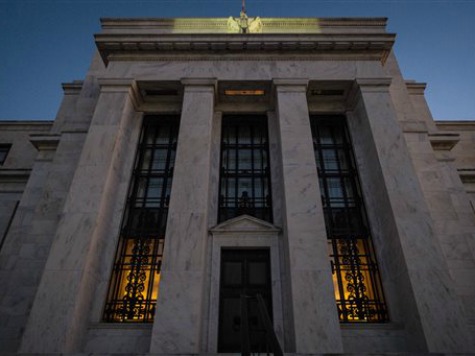As I traveled back from the EU this weekend, a story in the Financial Times about the unrealized losses that the Fed has generated on its vast portfolio of U.S. Treasury and Mortgage Backed Securities (MBS) caught my eye. These losses, contrary to the thinking some espouse, are not cause for concern.
The number is about $50 billion and growing, a fact that has Republican members of the House and Senate in an uproar. While Republicans ought to be concerned about many things going on at the Fed, the unrealized losses on central bank’s multi-trillion dollar securities portfolio accumulated under the program known as “Quantitative Easing,” or QE, are not among them.
First and foremost, let’s talk about why the Fed has been buying hundreds of billions of dollars’ worth of Treasury paper and MBS for the past several years. Back in 2008, when the subprime crisis exploded into the consciousness of global investors, the markets suddenly realized that the U.S. balance sheet was out of balance to the tune of tens of trillions of dollars. Toxic subprime paper created by the monopoly of big banks and government-sponsored entities such as Fannie Mae and Freddie Mac, and hidden via “off balance sheet” fraud, suddenly came rushing back into view and onto the balance sheets of U.S. banks.
Horrified investors fled the market for Treasury securities and MBS. Eventually, Fannie, Freddie, AIG, and, ultimately, Citigroup had to be rescued by the U.S. Treasury. The serious imbalance between assets and liabilities was illustrated by then-Treasury Secretary Hank Paulson, who famously announced in 2008 that Citigroup was insolvent and that we needed a “Super SIV” scheme to buy the toxic assets from the largest banks, including Citi, JPMorgan, and Bank of America.
Hank Paulson’s thinking about financial markets back in 2008 was about as primitive as GOP politicians’ thinking on the Federal Reserve’s balance sheet today. Former Treasury Secretary Lawrence Summers noted in the Financial Times in 2011: “[D]ubious assertions by policymakers end up undermining confidence. Like the 13th chime of a clock, policymakers who deny the obvious or claim to know the unknowable call into question all that they say.”
Thankfully, while Paulson was about to destroy the global economy with a series of really ill-considered proposals, the central bank under Chairman Ben Bernanke acted decisively to add liquidity so that the “equity” of the U.S. economy would not be wiped out in a forced liquidation.
Simply stated, since 2008, the Fed has been buying Treasury bonds and MBS because private investors have not been willing to do so. Even today, as the Fed has started to taper bond purchases, the actual demand for credit in the U.S. economy is still very weak, calling into question whether or not the Fed can fully end all bond purchases, much less sell the accumulated portfolio. The risk in 2008 and today remains the same, namely deflation.
But sadly, the level of understanding of monetary policy by members of both parties in Congress is incredibly unsophisticated. Members of the GOP actually spend time worrying about the Fed taking tens or even hundreds of billion in paper losses, rather than thanking former Fed Chairman Bernanke and his colleagues for avoiding tens of trillions of dollars’ worth of wealth destruction for the private economy. Had we followed the advice of Secretary Paulson and his equally inept successor, Timothy Geithner, the global economy would today be in a new Dark Age.
Congressional Republicans need to understand that the Fed will probably never sell any of its portfolio of Treasury bonds and MBS–at least not until the private demand for assets increases dramatically from current levels. And in that event, having the Fed take paper or even actual losses on its bond portfolio as interest rates rise is just fine. Such losses will mean that the U.S. economy is really recovering and creating trillions of dollars in new wealth, along with badly needed jobs and consumer income. Losses by the Fed must also be balanced against the vast profits booked by the central bank and transferred to the Treasury over the past several years.
For a while now, I have been arguing that the Fed needs to push interest rates up to restore some balance between debtors and savers. But that does not mean that the Fed should, or will anytime soon, end the volume of its support for the U.S. financial markets. Indeed, the Fed ought to immediately raise the rate paid on the several trillion dollars in bank reserves on deposit with the central bank, a notion that will shock many congressional Republicans.
By allowing interest rates to slowly rise, we can increase the flow of income through the financial markets and, yes, even through the banking system, and advance the goal of restoring some degree of normalcy to the U.S. economy. Fed transfers to the Treasury will fall, but that’s fine. To help the Fed move towards this goal, congressional leaders in both parties need to abandon their childlike beliefs about monetary policy and start to think differently about the role of the Federal Reserve System in our global economy. The earth is not flat, and the prospects of tens of billions in losses on the Fed’s portfolio is, believe it or not, good news.
Mr. Whalen is completing a new book co-authored with Frederick Feldkamp entitled Financial Stability: Fraud, Confidence & the Wealth of Nations, scheduled to be published by John Wiley & Sons in the second half of 2014.

COMMENTS
Please let us know if you're having issues with commenting.